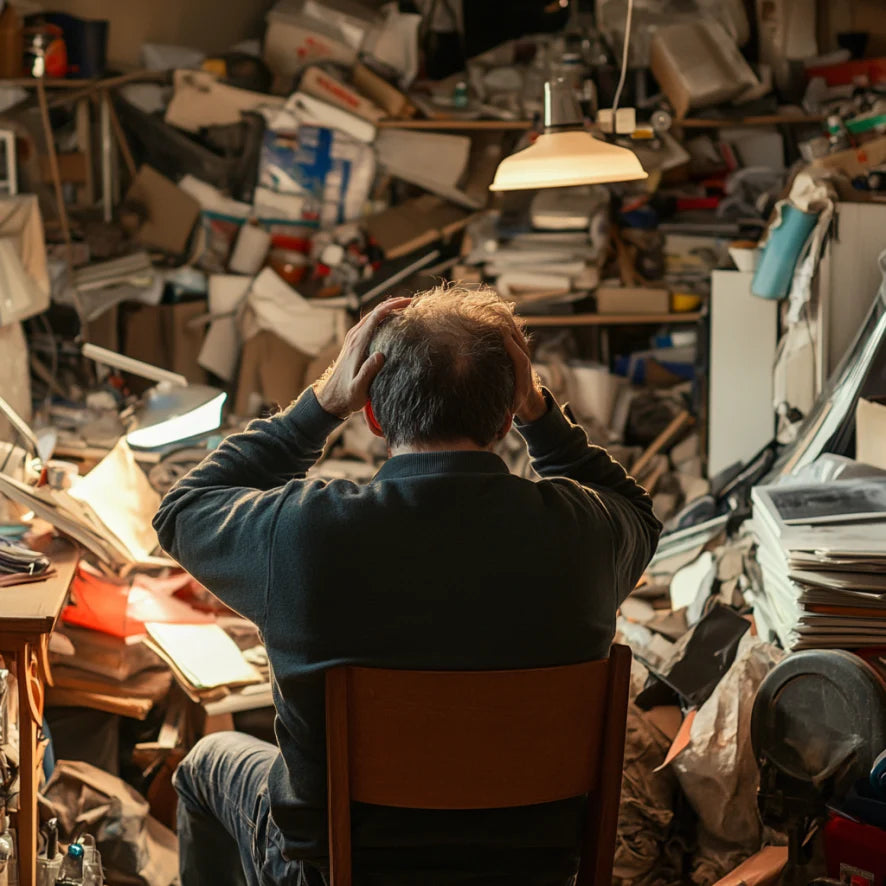
Mindful Storage: Decluttering for Better Mental Health
|
|
Time to read 6 min
|
|
Time to read 6 min
Clutter is more than just a physical inconvenience; it profoundly affects the mind, impacting mental health and diminishing focus. Without a structured mindset and clear organizational goals, clutter can easily derail your productivity and well-being. The presence of clutter often correlates with heightened stress levels, reducing the clarity needed for effective decision-making and task completion. Understanding the psychological impact of chaos in our environment is crucial for those seeking mental clarity and focus improvement. In this discussion, we will delve into the relationship between clutter and the mind, offering practical decluttering tips and home organization strategies to foster stress reduction and enhance overall mental health.
Table of Content
Storytime!
Last Tuesday, I found myself standing in my garage, surrounded by towers of mystery boxes and unnamed bins, feeling my anxiety spike with each passing minute. You know that overwhelming sensation when your physical space is cluttered, and suddenly your mind feels just as messy? There I was, desperately searching for my tax documents from 2022, while my brain played an unhelpful highlight reel of every other missing item in my life. Science tells us this mental chaos isn't just in our heads – when our spaces are disorganized, our brains actually have to work overtime, constantly processing the visual noise of clutter and reminding us of unfinished organization tasks. It's like having 37 browser tabs open in your mind, each one screaming for attention. But here's the thing: just as closing those tabs brings instant relief, utilizing organized storage solutions can transform both your physical space and your mental wellbeing.
Further Readings
→ The connection between cleanliness and mental health
→ Cluttered house, cluttered mind: why mental health matters
Clutter can significantly impair the mind's ability to focus. When surrounded by disorder, the brain struggles to concentrate on tasks at hand, leading to a constant state of distraction. This lack of focus can hinder productivity, making it difficult to complete daily tasks efficiently. The cluttered environment competes for attention, leaving little room for clear thinking and effective decision-making. Furthermore, the mind may become overwhelmed by the sheer number of items vying for its attention, resulting in mental fatigue.
To combat this, adopting home organization strategies can help create a more conducive environment for focus improvement. By systematically decluttering and organizing spaces, individuals can reduce cognitive load, allowing for sharper concentration and enhanced mental clarity. Understanding the link between clutter and the mind is essential for those seeking to improve their focus and overall mental health.
Effective organization is a powerful tool for stress reduction. Clutter often serves as a visual reminder of tasks left unfinished, which can heighten anxiety levels. By organizing your surroundings, you can create a sense of order that translates into mental peace. When everything has a designated place, and your environment is tidy, it reduces the time and effort spent searching for misplaced items, thereby alleviating stress.
As a result, organized surroundings promote a calmer mind, allowing individuals to focus on what truly matters. By prioritizing organization, you can create an environment that supports mental health and fosters a sense of well-being.
"A tidy space allows you to focus on what truly matters."
Clutter often contributes to procrastination by overwhelming the mind and delaying action on essential tasks. When faced with a chaotic environment, it can be challenging to know where to begin, causing individuals to postpone decision-making and task completion.
Decluttering, however, can be a practical step toward overcoming procrastination. By systematically organizing spaces and eliminating unnecessary items, you can create a more inviting environment that encourages productivity. Decluttering not only clears physical space but also frees mental space, reducing the barriers that lead to procrastination.
As order is restored, the mind becomes more motivated, leading to improved focus and task execution. In essence, decluttering serves as a catalyst for action, helping to break the cycle of procrastination and foster a proactive approach to daily responsibilities.
By incorporating these techniques, you can transform your living space into a more organized, calming environment that supports mental clarity and focus improvement:
"Clutter is not just the stuff on your floor. It’s anything that stands between you and the life you want to be living."
By following these practical decluttering tips, you can create a more orderly environment that fosters mental clarity and focus improvement:
Remember that tidying up isn’t just about making space; it’s about making room for joy, creativity, and a sprinkle of peace in your life. So, whether you’re diving into a full-blown decluttering spree or just tackling that one pesky junk drawer, know that every little bit counts! After all, a little organization can go a long way in clearing the mental fog and boosting your mood. Your mind (and your living room) will thank you.
Understanding the psychological effects of clutter on mental well-being
Effective home organization techniques to reduce clutter
Essential tips for maintaining an organized home
Yes! A tidy and organized space helps clear your mind, reduce distractions, and create a more conducive environment for focus and productivity. When your surroundings are organized, it's easier to prioritize tasks and make decisions.
Start small by tackling one area at a time, such as a single drawer or shelf. Use the "one in, one out" rule to prevent accumulation, and set a timer for 15-30 minutes to make decluttering feel more manageable.
Establish a regular cleaning routine, designate specific places for items, and regularly assess your belongings to ensure you’re not accumulating unnecessary items. Consider implementing a “30-day rule” where you evaluate items you haven’t used in the last month.
Latest News


